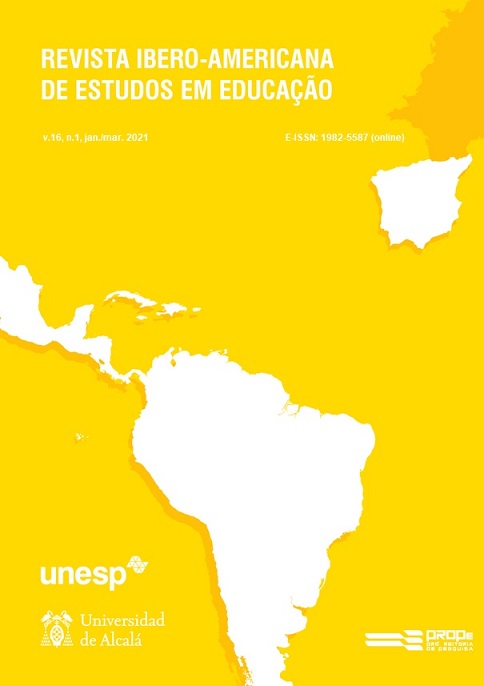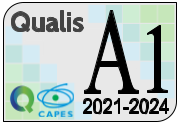Práticas e perspectivas dos professores estagiários no programa online de ensino de idiomas
DOI:
https://doi.org/10.21723/riaee.v16i1.13760Palavras-chave:
Estagiários, Educação on-line, Mérito, DeméritoResumo
As tecnologias instrucionais têm sido amplamente utilizadas após a disseminação do COVID19. O Conselho de Ensino Superior da Turquia fechou todas as universidades e iniciou o ensino on-line emitindo uma declaração de que todas as universidades eram livres para escolher a plataforma que desejavam usar. Este estudo tem como objetivo descobrir como os programas de formação de professores de idiomas on-line renderam padrões emergentes e como as perspectivas dos formandos estavam em relação a esses programas de formação de professores de idiomas on-line. Para alcançar esse objetivo, 275 professores estagiários do Departamento de Ensino de Língua Inglesa participaram do estudo e entrevistas semiestruturadas foram realizadas com eles. Esta discussão esclarece questões e atitudes críticas dos formandos, juntamente com os desafios exclusivos dos programas como uma agenda de pesquisa futura.
Downloads
Referências
BLAKE, R. The use of technology for second language distance learning. The Modern Language Journal, v. 93, n. 1, p. 822-835, 2009.
CHUN, D. CALL technologies for L2 reading post Web 2.0. In: ARNOLD, N.; DUCATE, L. (Eds.). Present and Future Promises Of CALL: From Theory and Research to New Directions in Language Teaching. San Marcos, TX: CALICO, 2011. p. 131-169.
COPE, W.; KALANTZIS, M. New media, new learning. The International Journal of Learning, v. 14, n. 1, p. 75-79, 2007.
DARASAWANG, P.; REINDERS, H. Encouraging autonomy with an online language support system. CALL-EJ Online, v. 11, n. 2, 2010. Available in: http://callej.org/journal/11-2/darasawang_reinders.html. Access in: may 2020.
DEWEY, J. Experience and education. New York, NY: Macmillan, 1938.
FAULK, N. Perceptions of Texas public school superintendents regarding online teacher education. Journal of College Teaching & Learning, v. 8, n. 5, p. 25-31, 2011.
HOCKLY, N. Developments in online language learning. ELT Journal, v. 69, n. 3, p. 308-313, 2015.
HUBBARD, P. CALL and the future of language teacher education. CALICO Journal, v. 25, n. 2, p. 175-188, 2008.
ISTI’ANAH, A. The effect of blended learning to the students’ achievement in grammar class. Indonesian Journal of English Education, v. 4, n. 1, p. 16-30, 2017.
KULES, B.; MCDANIEL, J. LIS program expectations of incoming students' technology knowledge and skills. Journal of Education for Library and Information Science, v. 51, n. 4, p. 222-232, 2010.
MARKEN, J.; DICKINSON, G. Perceptions of Community of practice development in online graduate education. Journal of Education for Library and Information Science, v. 54, n. 4, p. 299-306, 2013
MOQADAM-TABRIZI, M. Investigating the effectiveness of an online course in English language teaching program in a rural Iranian context. Language Teaching and Educational Research (LATER), v. 1, n. 2, p. 175-186, 2018.
MOLCHANOVA, I. Influence of the internet on studying English. International Education Studies, v. 8, n. 1, p. 133-141, 2015.
NASH, R. Equality of educational opportunities: In defense of the traditional concept. Educational Philosophy and Theory, v. 36, n. 4, p. 361-377, 2004.
PAWAN, F.; WIECHART, K.; WARREN, A.; PARK, J. Pedagogy and Practice for Online English Language Teacher Education. Alexander, VA: TESOL Press, 2016.
SHIN, D. S.; KANG, H. S. Online language teacher education: Practices and possibilities, RELC Journal, v. 49, n. 3, p. 369-380, 2018
SMITH, G. G.; SORENSON, C.; GUMP, A.; HEINDEL, A. J.; CARLS, M.; MARTINEZ, C. D. Overcoming student resistance to group work: Online versus face-to-face. Internet and Higher Education, v. 14, n. 2, p. 121-128, 2011.
SU, B.; BONK, C. J.; MAGJUKA, R. J.; LIU, X.; LEE, S. H. The importance of interaction in web-based education: A Program-level case study of online MBA courses. Journal of Interactive Online Learning, v. 4, n. 1, p. 1-19, 2005
TSAI, H. C. An overview of rural situation and rural community development in Taiwan. APO-ICD papers (Asian Productivity Organization-Integrated Community Development) Retrieved June 6, 2020. Available in: http://www.apo-tokyo.org/icd/papers/E-Publications/02.IntegLocCommDev/02-04.pdf. Access in: may 2020.
USHIDA, E. The role of students’ attitude and motivation in second language learning in online language courses. Calico Journal, v. 23, n. 1, p. 49-78, 2005
WARSCHAUER, M. Motivational aspects of using computers for writing and communication. In: WARSCHAUER, M. (Ed.). Telecommunication in Foreign Language Learning: proceedings of the Hawaii Symposium. Honolulu: University of Hawaii, Second Language Teaching & Curriculum Center, 1996. p. 29-46.
WHITE, C. The Distance learning of foreign languages: a research agenda. Language Teaching, v. 47, n. 4, p. 538-553, 2014.
WİLLİAMS, M. L.; PAPROCK, K.; COVİNGTON, B. Distance learning: the essential guide. Thousand Oaks, California: Sage, 1999.
YANG, Y. C.; CHUANG, Y. C.; LI, L. Y.; TSENG, S. S. A blended learning environment for individualized English listening and speaking integrating critical thinking. Computers and Education, v. 63, p. 285-305, 2013.
Downloads
Publicado
Como Citar
Edição
Seção
Licença
Copyright (c) 2020 Revista Ibero-Americana de Estudos em Educação

Este trabalho está licenciado sob uma licença Creative Commons Attribution-NonCommercial-ShareAlike 4.0 International License.
Manuscritos aceitos e publicados são de propriedade dos autores com gestão da Ibero-American Journal of Studies in Education. É proibida a submissão total ou parcial do manuscrito a qualquer outro periódico. A responsabilidade pelo conteúdo dos artigos é exclusiva dos autores. A tradução para outro idioma é proibida sem a permissão por escrito do Editor ouvido pelo Comitê Editorial Científico.








